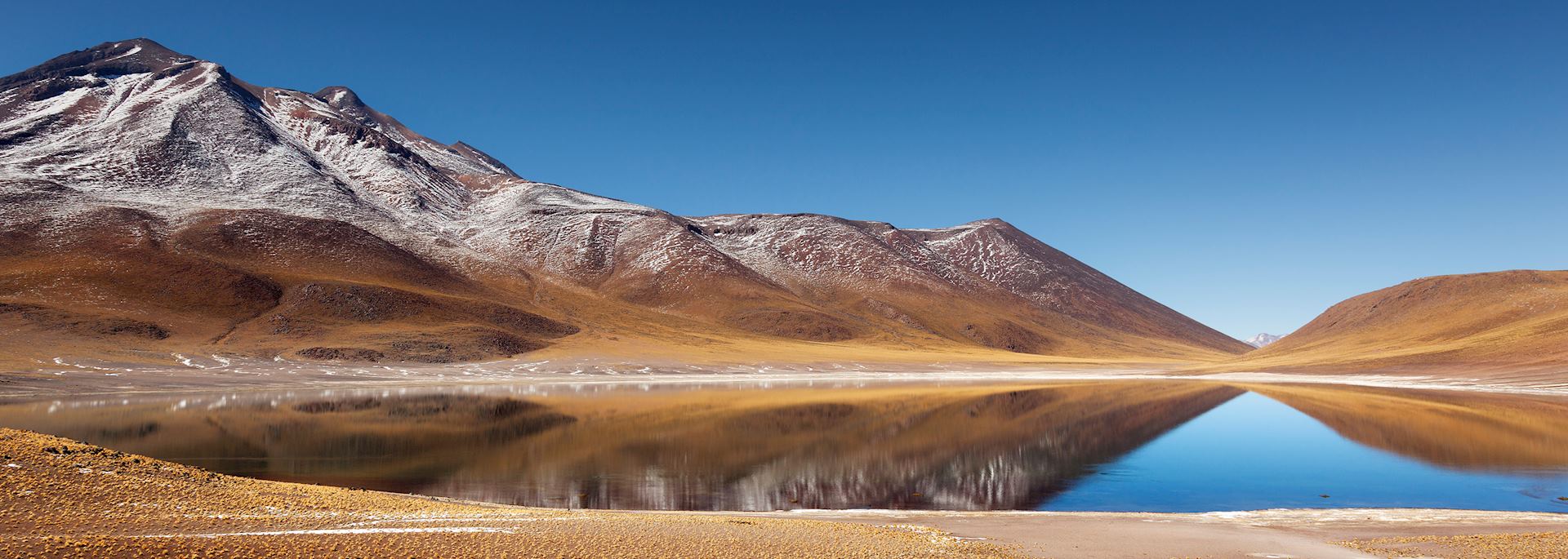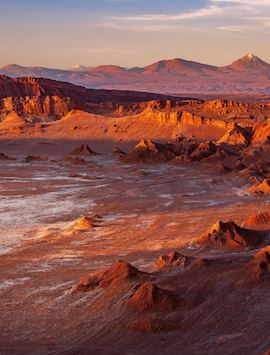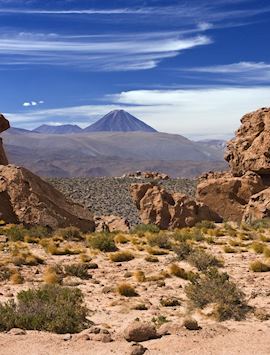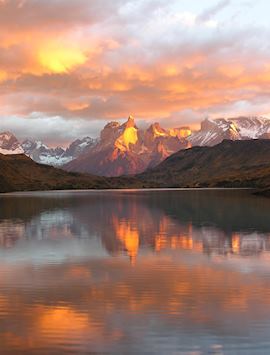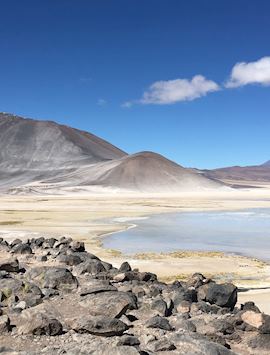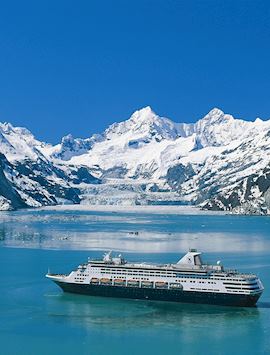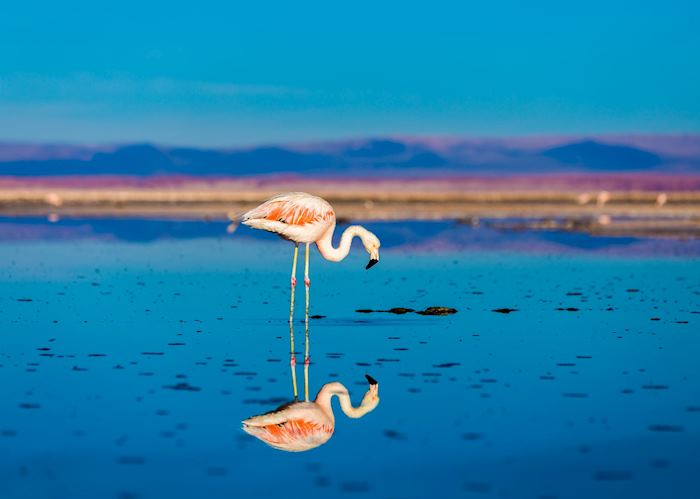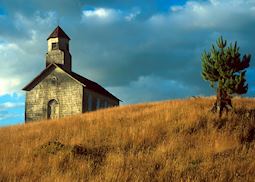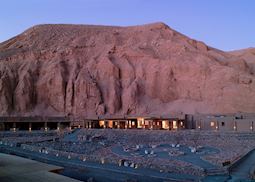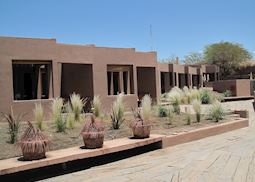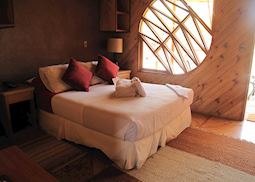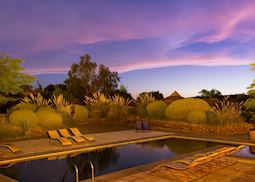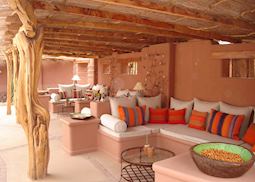Jump to:
Orange dust swirls from a barren landscape littered with craters and volcanoes, and framed by gigantic, windswept dunes. Sandwiched between the Andes and the Pacific Ocean, the Atacama Desert is unforgiving terrain, but also a place of great beauty.
The desert is at its most striking during the first and final hours of the day, when the Andes flicker between gold and crimson, glowing pink at nightfall. Due to its high altitude, the skies here are remarkably clear, making for some of the world’s best stargazing.
Despite being formally identified as the driest desert in the world, the Atacama is teeming with life. There are enormous salt flats and emerald altiplanic lagoons, where you can observe rare Andean flamingos feeding in the mirror-like water. It’s also a landscape that deeply rewards hikers and mountain-bikers, with trails leading through lunar-like valleys and canyons.
 Due to the Atacama Desert’s extreme conditions, human settlements are few and far between. Following the road from Calama, the desert gives way to the oasis town of San Pedro de Atacama. Despite its rustic appearance and the odd stray dog, it’s full of elegant hotels and artisan restaurants. Adobe brick houses, decorated with bright mosaics of marbles and glass bottles, line cobbled streets.
Due to the Atacama Desert’s extreme conditions, human settlements are few and far between. Following the road from Calama, the desert gives way to the oasis town of San Pedro de Atacama. Despite its rustic appearance and the odd stray dog, it’s full of elegant hotels and artisan restaurants. Adobe brick houses, decorated with bright mosaics of marbles and glass bottles, line cobbled streets.
A two-hour drive from San Pedro de Atacama is the El Tatio geyser field. Its bubbling geysers and sulphurous fumaroles come alive in the early hours of the morning, when faint morning rays illuminate the steamy landscape. You can seek refuge from the chilly morning air in the heat released by the water rocketing skyward. By 7.00am, like clockwork, the spectacle is over.
Valle de la Luna, named after its moon-like appearance, is a popular location to gather in the late afternoon, a glass of pisco sour in hand. From the clifftops, you’re ideally placed to glimpse the Andes’ sunset display. Better still to visit in the morning: as the sun wakes, the craggy rocks are set ablaze and the place is empty. You can wander through its desolate dunes, razor peaks and wind-whipped craters on a guided walk.
Picking your way past petroglyphs, take a break from the desert’s expanse of red-tinged plains by feasting your eyes on the vivid greens and purples of the Rainbow Valley. After a short walk, you can breakfast against a backdrop of kaleidoscopic rocks, their pigmentation created by the mud and minerals found in the soil.
 Dispersed in between the volcanoes are white expanses of crunchy salt flats encircling turquoise altiplanic lagoons. You can take a tour to Chile’s largest salt flat, Salar de Atacama. Escape the dry heat by floating in the salt-rich lake and spot the pink plumage of Chilean flamingos nesting nearby.
Dispersed in between the volcanoes are white expanses of crunchy salt flats encircling turquoise altiplanic lagoons. You can take a tour to Chile’s largest salt flat, Salar de Atacama. Escape the dry heat by floating in the salt-rich lake and spot the pink plumage of Chilean flamingos nesting nearby.
A maze of desert badlands and twisting canyons lead toward the Quebrada del Diablo (Devil’s Throat) lookout. You can mountain bike here, passing by chameleon-like rocks: their shades change from a sulphurous yellow to auburn, depending on the angle of the harsh sun.
The Atacama Desert’s altitude makes for clearly displayed stars, planets and nebulas at night. The area has attracted the world-leading ALMA Observatory, among others.
Best time to visit the Atacama Desert
The Atacama is generally warm and dry all year round, with a wetter season in January and February. It’s ideal to visit in Chile’s winter, from May to July, when travel to places like Patagonia is not recommended.
In the winter months it can be easily combined with a visit to Easter Island, or a trip encompassing Bolivia and/or Peru.
who's been there

Start planning your tailor-made trip to the Atacama Desert by contacting one of our Chile specialists
-
01993 838 92501993 838 640
- Make an enquiry
Suggested itineraries featuring the Atacama Desert
Our itineraries will give you suggestions for what is possible when you travel in the Atacama Desert, and they showcase routes we know work particularly well. Treat them as inspiration, because your trip will be created uniquely by one of our specialists.
Places in and around the Atacama Desert
- San Pedro de Atacama The Atacama Desert
Photos of the Atacama Desert
Our expert guides to exploring the Atacama Desert
Written by our specialists from their own experiences of visiting the Atacama Desert, these guides will help you make the most of your time there. We share both our practical recommendations and the best ways to appreciate the Atacama Desert at its best.
-
What to do in Chile: our highlights guide ![A church in southern Patagonia, Chile]()
What to do in Chile: our highlights guide
What to do in Chile: our highlights guide
Chile is a land of geographical contrasts, from the arid Atacama Desert to the peaks and glaciers of Patagonia. Cultural differences are equally stark as Spanish-built wooden churches on Chiloé Island vie for the visitor’s attention along with the incongruous and mysterious stone statues on Easter Island.
Read this guide
Accommodation choices for the Atacama Desert
We've selected a range of accommodation options for when you visit the Atacama Desert. Our choices usually come recommended for their character, facilities and service or location. Our specialists always aim to suggest properties that match your preferences.
-
![Tierra Atacama, San Pedro de Atacama]() Responsible ChoiceWe've hand-selected a range of tours and stays across the world that go above and beyond to be a force for good by supporting local businesses, educating staff, challenging local norms, or promoting conservation and biodiversity efforts. Your Responsible Choice helps increase the positive impact of your trip.
Responsible ChoiceWe've hand-selected a range of tours and stays across the world that go above and beyond to be a force for good by supporting local businesses, educating staff, challenging local norms, or promoting conservation and biodiversity efforts. Your Responsible Choice helps increase the positive impact of your trip.Tierra Atacama
San Pedro de Atacama -
![Alto Atacama, San Pedro de Atacama]()
Nayara Alto Atacama
San Pedro de Atacama -
![Casa Atacama]()
NOI Casa Atacama
San Pedro de Atacama -
![Standard Room, Poblado de Kimal]()
Hotel Poblado Kimal
San Pedro de Atacama -
![The pool at Hotel Altiplanico Atacama]() Responsible ChoiceWe've hand-selected a range of tours and stays across the world that go above and beyond to be a force for good by supporting local businesses, educating staff, challenging local norms, or promoting conservation and biodiversity efforts. Your Responsible Choice helps increase the positive impact of your trip.
Responsible ChoiceWe've hand-selected a range of tours and stays across the world that go above and beyond to be a force for good by supporting local businesses, educating staff, challenging local norms, or promoting conservation and biodiversity efforts. Your Responsible Choice helps increase the positive impact of your trip.Our Habitas
San Pedro de Atacama -
![Awasi, San Pedro de Atacama]()
Awasi Atacama
San Pedro de Atacama -
![Terrantai Lodge Terraces]()
Terrantai Lodge
San Pedro de Atacama

